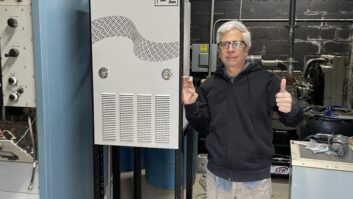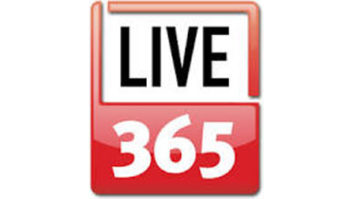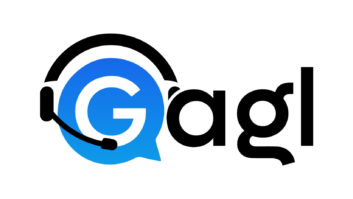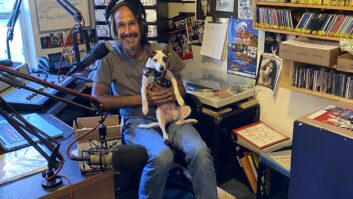

The front and back of Undercover Radio’s station T-shirt. Proceeds from shirts sold through booster.com will go to Wounded Warrior Project. Something strange happens on 6925 kHz on the weekends. This slice of frequency, just below the 40-meter amateur radio band, is normally reserved for government fixed and mobile services and contains very few, if any, active stations. But on Friday or Saturday evenings it may suddenly spring to life with music, chat and commentary as if it was in the AM or FM broadcast band, as shortwave pirate radio operators begin their broadcasts.
“There is a small group of pirate operators who, in truth, should really be called hobby broadcasters,” says a pirate radio operator who calls himself Dr. Benway.
“We are not the evil, swashbuckling, pillaging pirates that some make us out to be. We are ordinary citizens who love to broadcast as a hobby.”
Many of these ordinary citizens have other causes they are passionate about as well. Dr. Benway, while flying his modulated Jolly Roger, has even begun to use his on-air activities to support a charity that helps wounded soldiers returning from conflict overseas.
If propagation conditions are good, listeners in North America can use an off-the-shelf shortwave radio to receive his, and many other, buccaneer broadcasters who weigh anchor and set sail on oceans of ionosphere noise from their secret locations somewhere in the “middle of nowhere.” Many pirates report that they’ve been heard all over North and South America, Europe and even into Australia and New Zealand.
Listeners might hear something like this monologue broadcast by Dr. Benway’s station “Undercover Radio.” It’s a flashback to a psychedelic experience from his past:
“Orange fireflies danced all around me, and suddenly, I was transported to a different place and time. Somehow, it was a more modern time, a sad time. A time of modernization. And a time of the slow death of our harmony with Mother Nature. And I watched, but I resisted this modern time. I was trying to hold on to the old ways. But in my heart I knew it was a losing battle.”
SCARED OFF
Most North American pirate radio operators who broadcast in the shortwave bands do so between 6850 kHz and 6935 kHz. Some stations will occasionally transmit Morse code, Slow Scan Television or radio teletype, but most stick to amplitude modulation or single-sideband modes so they can be heard by the largest audience possible.
Stations on the air these days sport names like Pirate Radio Boston, Partial India Radio, Renegade Radio, Twangy Radio, WBNY: Radio Bunny and The Crystal Ship.
Ragnar Daneskjold is one of five editors of the “Free Radio Weekly,” an email newsletter that reports listener loggings of shortwave pirate stations. A few years ago he explained the appeal of listening to pirate radio in an email. “Some of the most interesting, creative material in media can be found on pirate radio,” he wrote.
Like many of his fellow shortwave pirates, Dr. Benway, who declines to give his real name, has been at this for a long time. His first foray into pirate radio, in the late 1970s, ended when his signal overloaded the family TV set and he blew the transmitter he had borrowed from his neighbor.
“It wasn’t until the mid-’80s that I picked up the mic again and began broadcasting on shortwave as Progressive Music Radio,” Dr. Benway said in an email. “After a few adventures with that station I was scared off the air by a close call with the FCC.
“One evening in the middle of a broadcast I was sitting in my car and noticed a large van shooting across the parking lot straight at me. The occupants inside the van were pointing straight at me. Then I realized the van had government plates on them. It was the FCC!
“I hit the gas and took off with gear flying everywhere and the large antenna whipping around. I went straight towards them and passed right by them. They were making the turn after me so with major adrenaline pumping through me I flew down the back streets of the neighborhood at top speed. Eventually, I came to a stop at the curb, tore the antenna off the car and stashed the gear in the hatchback area. Luckily the van never came down that street. I made my way back home and sat waiting for a knock on the door,” he said.
“Luckily the knock never came but it scared me right off the air until the ’90s. The current station, Undercover Radio, was born in 2003 and operates sporadically on the shortwave bands, and just above the AM broadcast band on 1720 with occasional broadcasts on 1710. All other frequencies are very crowded, and I really don’t want to interfere with licensed stations.”
FREE SPEECH
Pirate radio operation violates federal law, specifically the Communications Act. It generally comes in two forms, low-power FM (not to be confused with licensed LPFM) and shortwave.
The Federal Communications Commission posts recent actions against pirate radio operators on its website. All of its successful enforcement activity appears to be directed toward FM pirates, many of which make the news when they are busted, often in densely populated areas like southern Florida, New York and parts of California.
No shortwave stations are listed in the actions.
This lack of enforcement may help embolden pirate operators who broadcast on shortwave. Breaking the law certainly doesn’t deter Dr. Benway. He justifies operating his pirate radio station by appealing to the Constitution and asserting what he sees as his First Amendment rights.

A QSL card from Undercover Radio. “I believe I am exercising my right to free speech,” he said. “Our forefathers could never have envisioned the technologies that would follow, but I believe that they would agree that free speech would apply to all forms of media.”
The FCC does not agree, however, and neither does the Supreme Court. In a posting on their website, the FCC addresses this claim directly.
“A number of inquiries received at the commission are from persons or groups who believe that there is a First Amendment, constitutionally protected right to broadcast. However, the Supreme Court of the United States has repeatedly ruled on this subject and concluded that no right to broadcast exists,” the FCC website says.
According to a letter to Congress from FCC Chairman Tom Wheeler, also posted on the FCC website, most of the resources devoted to enforcement actions are focused on low-power FM pirates in large urban areas where the interference is most problematic. The technical complexity of tracking stations, resources that are already stretched thin, and the lack of complaints against shortwave pirate stations explains why the FCC rarely takes action against them.
NATURAL FIT
Recently Dr. Benway began offering T-shirts, featuring his station logo, for sale on the fundraising website booster.com. While the shirts promote the station, the proceeds, Benway says, will go to the Wounded Warrior Project to help veterans who have been injured in combat overseas.
This type of fundraising is unusual for a pirate radio operator, but there is nothing illegal about selling shirts and booster.com handles all the orders and shipping, making the entire process anonymous.
“I selected the Wounded Warrior Project Inc. because I have been involved in other efforts with them over the years,” he said. “It just seemed like a natural fit. Pirate operators fight for free speech, and our warriors fight for the freedom of our country.”
The Wounded Warrior Project serves warriors and their families through a holistic approach, nurturing the mind and body of injured soldiers. According to the WWP website, it hopes to “foster the most successful, well-adjusted generation of wounded service members in our nation’s history.”
Contacted about this fundraiser, Wounded Warrior Project declined to comment or answer questions about how it would like people to assist in raising funds or about accepting money raised by a presumably illegal radio station. Its website does offer several ways to get involved with the organization:
“Wounded Warrior Project invites you to honor and empower Wounded Warriors by becoming a Proud Supporter and hosting your own fundraising campaign. WWP has various ways you can become a Proud Supporter to make a difference in the lives of wounded service members and their families.”
These ways include volunteering, participating in a sponsored charity event, engaging in social media and by supporting their sponsors.
So far, using his own unique fundraising methods, Dr. Benway has managed to raise around $300 for Wounded Warrior Project, and he says, he has extended sales of his station T-shirt to try to raise more.
“It’s a really nice shirt at a great price, and it would be amazing to see boosters send a substantial check to Wounded Warrior Project,” Dr. Benway said.
Undercover Radio’s shirt fundraiser is visible at www.booster.com/ucr or www.booster.com/ucr2. For information on Wounded Warrior Project, visit www.woundedwarriorproject.org.
Christopher Friesen wrote about spy “numbers stations” in January and radiosport in May. See radioworld.com, keyword Friesen.












